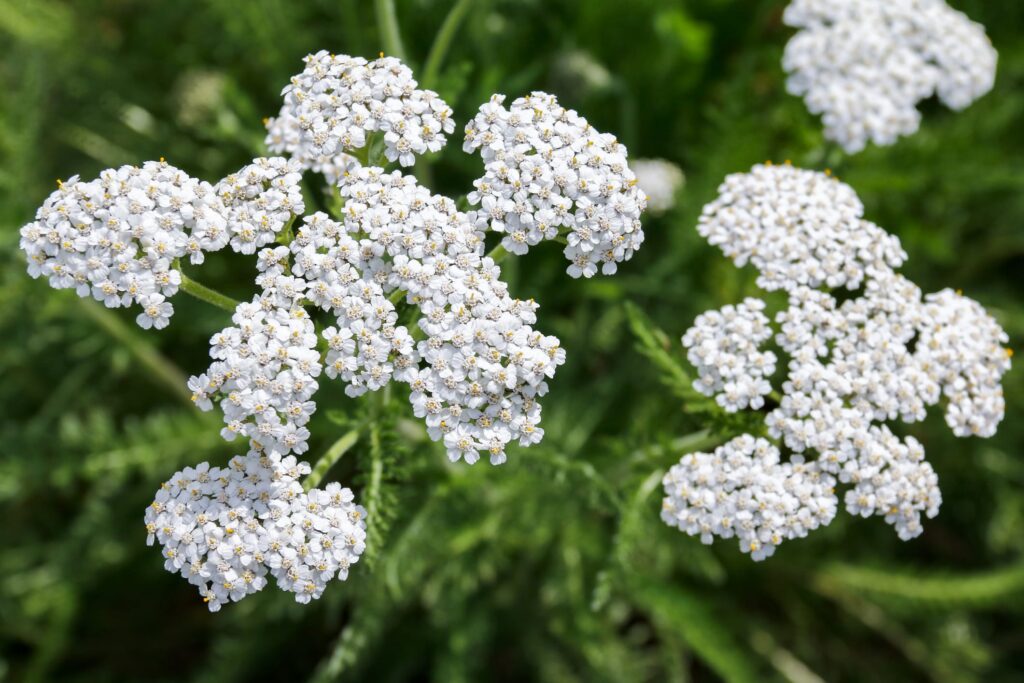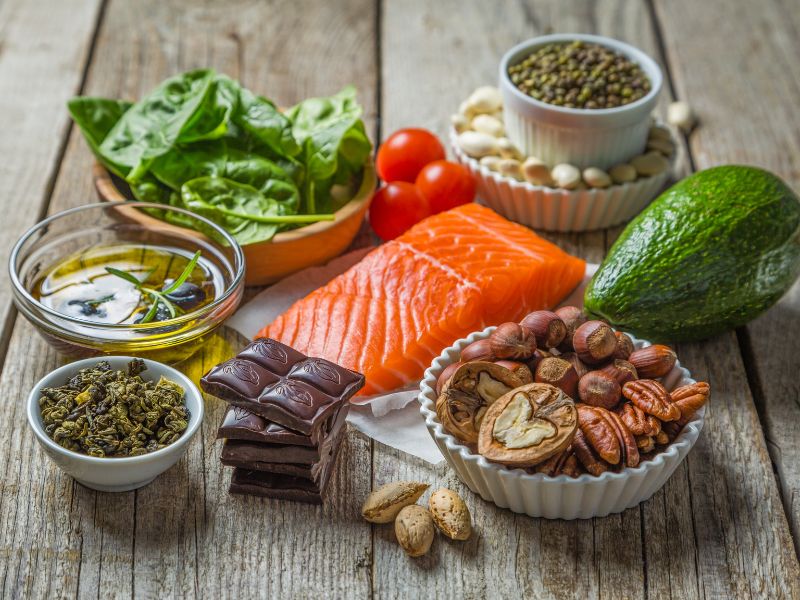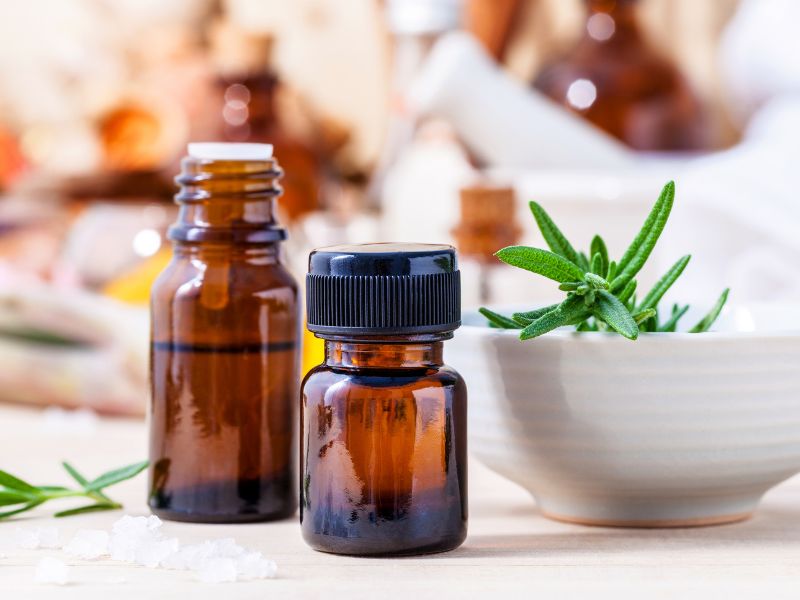If you’ve heard that “yarrow essential oil is a wonderful aperient,” or that “eucalyptus can be used as a febrifuge,” and ended up with more questions than answers, then don’t worry! Today we’ll be walking through the essentials of what you need to know about essential oil terminology.
A Good Place to Start
It takes an aromatherapist years of education and practice to learn the many therapeutic effects and terms associated with aromatherapy. This scientific language can leave beginners scratching their heads and confused about the actual functions of essential oils.
While there are hundreds of terms that Registered Aromatherapists use to describe the therapeutic actions of herbs and essential oils, it’s important to start with the basics. We’ve put together a list of 20 aromatherapy terms you need to know to help you choose the right essential oils, whether you’re pursuing a career as a Certified Aromatherapist or just using essentials for yourself and your loved ones.
Below is a quick breakdown of the 20 basic terms. We’ve included the term, a pronunciation guide, a summary of what the term means, and a few examples of herbs or oils with that property.
Twenty Essential Terms
1. Anodyne
-
- (an’o-dine)
- An essential oil used to relieve pain when applied externally. It can also be called an analgesic.
- Examples:
- Chamomile Chamaemelum nobile (L.) All.
- Yarrow Achillea millefolium (L.)
- Peppermint Mentha piperita (L.)
2. Anticatarrhal
-
- (an” te-kah-tar’al)
- An essential oil used to heal inflammation of the mucous membranes.
- Examples:
- Pine Pinus sylvestris (L.)
- Thyme Thymus vulgaris (L.)
- Yarrow Achillea millefolium (L.).
3. Antiemetics
-
- (an”te-e-met’ik)
- An essential oil used to lessen nausea and prevent or relieve vomiting.
- Examples:
- Basil Ocimum basilicum (L.)
- Clove bud Syzygium aromaticum (L.)
- Fennel Foeniculum vulgare (Hill)
- Ginger Zingiber officinale (Roscoe)
- Lavender Lavandula angustifolia (Mill.)
- Peppermint Mentha piperita (L.).
4. Antibacterial
-
- (an”te-bak-ter’re-al)
- An essential oil that destroys or suppresses the growth or reproduction of bacteria.
- Examples:
- Anise Pimpinella anisum (L.)
- Bay Laurus nobilis (L.)
- Benzoin Styrax benzoin (Dryand.)
- Bergamot Citrus aurantium (L.) var. Bergamia
- Black pepper Piper nigrum (L.)
- Cajeput Melaleuca leucadendron (L.) var. cajuputi.
5. Antimicrobial
-
- (an”te-mi-kro’be-al)
- An essential oil capable of destroying micro-organisms or suppressing their multiplication or growth.
- Examples:
- Black pepper Piper nigrum (L.)
- Cajeput Melaleuca leucadendron (L.) var. Cajuputi
- Tea tree Melaleuca alternifolia (Cheel) and Leptospermum scoparium (Forst.) (Australia and New Zealand)
- Thyme Thymus vulgaris (L.).
6. Antipruritic
-
- (an”te-pru-rit’ik)
- An essential oil that relieves or prevents itching.
- Examples:
- Chamomile Chamaemelum nobile (L.) All.
- Geranium Pelargonium graveolens (L’Her.)
- Lavender Lavandula angustifolia (Mill.)
- Yarrow Achillea millefolium (L.).
7. Antispasmodic
-
- (an”te-spaz-mod’ik)
- An essential oil used to relieve nervous irritability and reduce or prevent excessive involuntary muscular contractions and spasms.
- Examples:
- Anise Pimpinella anisum (L.)
- Basil Ocimum basilicum (L.)
- Bergamot Citrus aurantium (L.) var. Bergamia
- Black pepper Piper nigrum (L.)
- Cajeput Melaleuca leucadendron (L.) var. Cajuputi
- Clove bud Syzygium aromaticum (L.)
- Cypress Cupressus sempervirens (L.)
- Fennel Foeniculum vulgare (Hill)
- Garlic Allium sativum (L.)
- Lavender Lavandula angustifolia (Mill.)
- Marjoram Origanum majorana (L.)
- Peppermint Mentha piperita (L.).
- Thyme Thymus vulgaris (L.).
8. Aperient
-
- (a-per’re-ent)
- An essential oil used as a mild evacuant or laxative to the bowels. It’s also known as a laxative.
- Examples:
- Bergamot Citrus aurantium (L.) var. Bergamia
- Black pepper Piper nigrum (L.)
- Fennel Foeniculum vulgare (Hill)
- Lemon Citrus limonum (Risso)
- Marjoram Origanum majorana (L.)
- Nutmeg Myristica fragrans (Houtt.)
- Yarrow Achillea millefolium (L.).
9. Bitters
-
- (bit’erz)
- An essential oil with a bitter taste that serves as a stimulant to the gastrointestinal membranes.
- Examples:
- Black pepper Piper nigrum (L.)
- Ginger Zingiber officinale (Roscoe)
- Yarrow Achillea millefolium (L.).
10. Carminative
-
- (kar-min’ah-tiv)
- An essential oil that stimulates intestinal peristalsis. It relieves and promotes the expulsion of gas from the gastrointestinal tract.
- Examples:
- Anise Pimpinella anisum (L.)
- Basil Ocimum basilicum (L.)
- Benzoin Styrax benzoin (Dryand.)
- Bergamot Citrus aurantium (L.) var. Bergamia
- Black pepper Piper nigrum (L.)
- Cajeput Melaleuca leucadendron (L.) var. Cajuputi
- Cinnamon Cinnamomum zeylanicum (Blume)
- Coriander Coriandrum sativum (L.)
- Fennel Foeniculum vulgare (Hill)
- Garlic Allium sativum (L.)
- Lemon Citrus limonum (Risso)
- Marjoram Origanum majorana (L.)
- Peppermint Mentha piperita (L.)
- Rosemary Rosmarinus officinalis (L.)
- Thyme Thymus vulgaris (L.)
- Yarrow Achillea millefolium (L.).
11. Cell Proliferant
-
- (selpro-lif’-er-ant)
- An essential oil that promotes rapid healing and restoration.
- Example:
- Lavender Lavandula angustifolia (Mill.).
12. Cephalic
-
- (sef’al-ic)
- An essential oil that is particularly healing for cerebral conditions and diseases.
- Examples:
- Basil Ocimum basilicum (L.)
- Clary sage Salvia sclarea (L.)
- Garlic Allium sativum (L.)
- Juniper berry Juniperus communis (L.)
- Rosemary Rosmarinus officinalis (L.).
13. Depurative
-
- (dep’u-ra”tiv)
- An essential oil that cleanses and purifies.
- Examples:
- Eucalyptus Eucalyptus globulus (Labill.)
- Fennel Foeniculum vulgare (Hill)
- Garlic Allium sativum (L.).
14. Diaphoretic
-
- (di”ah-fo-ret’ik)
- An essential oil that produces perspiration and sweat, as well as increased elimination through the skin. Diaphoretics differ from sudorifics.
- Examples:
- Basil Ocimum basilicum (L.)
- Black pepper Piper nigrum (L.)
- Cajeput Melaleuca leucadendron (L.) var. Cajuputi
- Rosemary Rosmarinus officinalis (L.)
- Thyme Thymus vulgaris (L.)
- Yarrow Achillea millefolium (L.).
15. Febrifuge
-
- (feb’-ri-fuj)
- An essential oil that reduces fever. It can also be called an antipyretic.
- Examples:
- Basil Ocimum basilicum (L.)
- Bergamot Citrus aurantium (L.) var. Bergamia
- Black pepper Piper nigrum (L.)
- Cajeput Melaleuca leucadendron (L.) var. Cajuputi
- Cedarwood Cedrus atlantica (G.Manetti)
- Chamomile Chamaemelum nobile (L.) All.
- Eucalyptus Eucalyptus globulus (Labill.)
- Lavender Lavandula angustifolia (Mill.)
- Thyme Thymus vulgaris (L.)
- Yarrow Achillea millefolium (L.).
16. Hypnotic
-
- (hip-not’ik)
- An essential oil that is a powerful relaxant and can induce sleep.
- Example:
- Chamomile Chamaemelum nobile (L.) All.
17. Pectoral
-
- (pek’to-ral)
- An essential oil that heals complaints of the lungs.
- Examples:
- Cedarwood Cedrus atlantica (G.Manetti)
- Eucalyptus Eucalyptus globulus (Labill.)
- Marjoram Origanum majorana (L.)
- Peppermint Mentha piperita (L.)
- Yarrow Achillea millefolium (L.).
18. Styptic
-
- (stip’tik)
- An essential oil that stops local bleeding and hemorrhaging, applied externally.
- Examples:
- Benzoin Styrax benzoin (Dryand.)
- Bergamot Citrus aurantium (L.) var. Bergamia
- Geranium Pelargonium graveolens (L’Her.)
- Yarrow Achillea millefolium (L.).
19. Tonic
-
- (ton’ik)
- An essential oil that stimulates, energizes, and strengthens the body.
- Examples:
- Basil Ocimum basilicum (L.)
- Bergamot Citrus aurantium (L.) var. Bergamia
- Black pepper Piper nigrum (L.)
- Cajeput Melaleuca leucadendron (L.) var. Cajuputi
- Thyme Thymus vulgaris (L.)
- Tarrow Achillea millefolium (L.).
20. Vulnerary
-
- (vul’ner-er”e)
- An essential oil that promotes the healing of fresh cuts or wounds.
- Examples:
- Benzoin Styrax benzoin (Dryand.)
- Bergamot Citrus aurantium (L.) var. Bergamia
- Cajeput Melaleuca leucadendron (L.) var. Cajuputi
- Chamomile Chamaemelum nobile (L.) All.
- Clove bud Syzygium aromaticum (L.)
- Eucalyptus Eucalyptus globulus (Labill.)
- Garlic Allium sativum (L.)
- Geranium Pelargonium graveolens (L’Her.)
- Juniper berry Juniperus communis (L.)
- Lavender Lavandula angustifolia (Mill.)
- Rosemary Rosmarinus officinalis (L.)
- Thyme Thymus vulgaris (L.).
Interested in Expanding Your Learning?
There are plenty more terms to learn when you’re choosing which oils to use, but with this starting list, you’re sure to start on the right foot! If you’re interested in learning more about essential oils and their wonderful benefits, consider enrolling in an online program in aromatherapy from the American College of Healthcare Sciences.
Which one of these terms is most helpful to you? Leave a note in the comments!
For questions, or to set up a call with an advisor, fill out this short form.
This content is for educational purposes only and is not intended to be medical advice. Always use herbs and essential oils with caution and keep out of reach of children. Use particular caution when pregnant or nursing. Always check contraindications and think safety first! The statements herein have not been evaluated by the FDA. Products are not intended to diagnose, treat, cure, or prevent disease.




